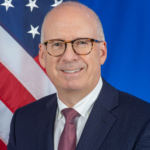Can Joint Innovation and Public-private Partnerships Prove to be the Noah’s Ark for Africa? | Blog
Almost 200 countries came together at the Climate Change Conference (COP 27) in Egypt last month to take action toward achieving the world’s collective climate goals. Among the event highlights was the establishment of a fund to assist the nations most vulnerable and impacted by the effects of climate change. Read on for key takeaways from COP 27 and implications for the Global South.
The much-anticipated conference, dubbed the Africa COP, marked 30 years since the adoption of the United Nations Framework Convention on Climate Change (UNFCCC). While much has transpired and the planet has come a long way in its fight against climate change since then, some nations have been left behind in achieving their carbon goals and are not experiencing the intended benefits.
Developing nations have long sought financial assistance to rebuild their social and physical infrastructure, but the World Bank and other publicly-funded lending institutions have failed to fulfill these growing needs. To address this issue, the UNFCCC, backed by the United Nations Environment Program and several attendee governments, launched a five-year work program to fund and promote smart technology solutions in developing nations, opening ground for tech providers to display their capabilities in the space.
COP 27 proved to be an instrumental platform for service providers and Big Tech players to engage in sustainability conversations and highlight their contributions towards the planet and its people.
The bridge towards a sustainable future must be pillared by collaboration and joint innovation in technology. Partnerships can be seen as the key to climate adaptation and mitigation. Many of these collaborations focus on marrying Artificial Intelligence (AI) and satellite technology. Some examples include:
- IBM is partnering with UK’s Science and Technology Facilities Council, among others, to leverage innovations in indexing multidimensional climate data to rapidly discover climate-relevant information from aerial imagery, maps, Internet of Things (IoT), drones, light detection and ranging (LiDAR) scanning, satellites, weather predictions, and climate change projections
- Microsoft collaborated with Planet Labs PBC and The Nature Conservancy to build the Global Renewables Watch – a first-of-its-kind living atlas intended to map and measure all utility-scale solar and wind installations on Earth using AI and satellite imagery
- Using high-quality geospatial data for disaster predictions and mitigation is very common in the more developed countries, whereas the Global South often lacks the resources and talent to generate and analyze reliable climate data. Partnerships among various stakeholders can bridge the climate data gap. Microsoft has committed to democratizing climate solutions in Africa by combining its AI prowess with Planet Labs PBC’s satellite imagery
The Loss and Damage Fund marked a momentous win for the Global South
As organizations do their part to help the Global South, COP 27 set a milestone by recognizing the disproportionate exposure of the poorer nations in Africa, Asia, and Latin America to climate change consequences. Established after years of appeals by the developing nations to compensate for losses due to climate disasters, the fund is viewed as a major political step to provide the appellants with a sense of justice and rebuild trust among nations.
Let’s take a look at other key implications for the Global South:
- Africa’s climate needs remain underfunded – While a step in the right direction, the Loss and Damage fund needs to be backed by effective policies and infrastructure to be beneficial. Historically, the funds promised by developed nations toward climate impact haven’t been fully disbursed or equitably distributed. The Climate Policy Initiative (CPI) noted that of the meager 25% of global climate investments that crossed the borders towards developing nations, Sub-Saharan Africa mobilized only 3% despite being the most vulnerable to climate adversities
- Global efforts and African needs are misaligned – Africa’s situation calls for urgent climate impact adaptation, but global climate funds and collaborations announced by service providers are only directed towards mitigation of climate impact
- African leaders will rethink their engagement with multilateral initiatives – African nations will further their strategies for adaptation and energy generation considering their primary concerns of poverty alleviation and economic development. Thus, the African region ranks as an attractive climate-related investment opportunity for private players. According to CPI data, private finance comprises half the global climate finance yet stands at just about 14% in Africa
- ESG regulations in Africa will become more stringent – As African nations advance in their sustainability journeys and try to attract foreign private investment, they will follow the global trend and strengthen their ESG regulations. Among many countries planning to launch such frameworks this year, Uganda referenced a “sustainable financial system” in its recent five-year plan
This opens several opportunities for service providers and consultants as more enterprises will require their expertise to transition to sustainable models. The increased volumes of ESG data generated will create opportunities for data analytics players, helping to bridge the climate data gap.
The world remains bullish on Africa’s future
COP 27 concluded on an optimistic note as technology, transparent funding, and developing nations’ needs became central to the climate resilience discussions. Innovative solutions across sectors are moving stakeholders closer to achieving their climate pledges.
Organizations are collaborating and prioritizing community impact in developing nations. Public-private partnerships toward sustainable models will make technology and welfare more accessible in these regions. With changing geo-political scenarios, Africa will prove to be an attractive opportunity for various investors and service providers.
To discuss further, please reach out to Rita Soni and Ambika Kini.
Rita Soni, Principal Analyst, Impact Sourcing & Sustainability Research
Email ID: [email protected]
LinkedIn: https://www.linkedin.com/in/ritansoni/
Twitter: https://twitter.com/ritaNsoni
Ambika Kini, Senior Analyst
Email ID: [email protected]
LinkedIn: https://www.linkedin.com/in/ambika-kini/
























